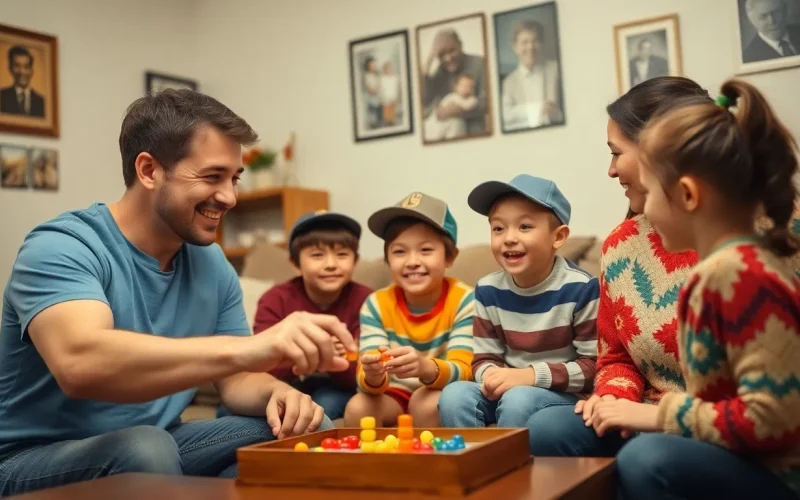Table of Contents
ToggleIn a world buzzing with distractions, family bonding often gets pushed to the back burner—like that leftover casserole no one wants to touch. Yet, nurturing those connections can be the secret sauce to a happier, healthier life. Whether it’s game night shenanigans or heart-to-heart talks over ice cream, these moments create memories that last a lifetime.
Imagine a family that laughs together, supports each other, and knows how to navigate life’s ups and downs with a wink and a smile. That’s the magic of strong family bonds. It’s not just about sharing a roof; it’s about sharing experiences that strengthen ties and create a sense of belonging. So, let’s dive into the art of family bonding and discover how to turn those everyday moments into extraordinary memories. After all, who wouldn’t want a family that’s as tight-knit as a pair of grandma’s favorite knitting needles?
Understanding Family Bonding
Family bonding refers to the emotional connections shared among family members. Strong relationships significantly contribute to overall well-being and happiness.
Definition and Importance
Family bonding encompasses the close ties and interactions among relatives. This connection fosters unity, support, and understanding. Healthy family relationships create a stable environment where individuals feel valued. Significant emotional and moral support emerges from strong family bonds. Commitment to nurturing these relationships brings about a sense of belonging, crucial in personal development.
Benefits of Strong Family Bonds
Strong family bonds yield numerous advantages. Individuals with solid relationships experience better mental health and lower stress levels. Children grow up with improved social skills and resilience, positively impacting their future. Positive interactions among family members enhance communication skills and emotional intelligence. Family members often provide encouragement, leading to improved motivation and achievement. Engaging in shared activities fosters joy and creates lasting memories.
Activities to Enhance Family Bonding

Engaging in activities together can significantly enhance family bonding. Families can choose from a variety of options that foster connection and build stronger relationships.
Outdoor Adventures
Exploring the great outdoors promotes physical activity while creating shared memories. Families can enjoy hiking, picnicking, or biking to develop a sense of adventure. Everyone appreciates nature’s beauty, and these outings offer chances for discussions. Camping trips provide opportunities for storytelling under the stars, enriching family relationships. Organizing a treasure hunt engages children and encourages teamwork, fostering cooperation and problem-solving skills.
Creative Projects
Sharing creative projects allows for expression and teamwork. Families can work on arts and crafts, which encourages collaboration and idea sharing. Setting up a family scrapbook or photo album helps preserve memories and sparks conversations about past experiences. Cooking or baking together teaches valuable skills and nurtures collaboration. Consider choosing a family theme day for themed costumes or decorations. Engaging in these creative activities strengthens bonds and cultivates a supportive environment for everyone.
The Role of Communication in Family Bonding
Effective communication serves as the foundation for strong family bonds. It helps build trust and understanding among family members, creating an environment where everyone feels safe expressing thoughts and feelings.
Open Dialogue
Open dialogue fosters connections within families. Encouraging children and adults to share their experiences promotes openness. Regular check-ins, such as family meetings, can enhance this practice. Discussing daily events helps keep everyone informed and engaged. Asking questions stimulates conversations, allowing members to express their opinions and concerns. Honest communication strengthens relationships by showing that everyone’s feelings matter. This approach nurtures confidence and ensures that all family members feel heard.
Conflict Resolution
Conflict resolution is crucial in maintaining family harmony. Addressing disagreements calmly and respectfully prevents misunderstandings. It’s important to focus on the issue, not the person, when discussing problems. Brainstorming solutions collaboratively encourages teamwork and compromise. Each family member should share their perspective without fear of judgment. After clarifying the conflict, families can work towards a solution that satisfies everyone. Practicing patience during disagreements reinforces unity and helps families grow stronger.
Challenges to Family Bonding
Family bonding faces several challenges in modern society. Busy lifestyles and social media have a profound impact on these connections.
Busy Lifestyles
Juggling work, school, and other commitments often leads to fragmented family time. Research shows that about 30% of families report feeling too busy to engage in meaningful activities together. Children involved in extracurricular activities may seldom find time for family meals. Distraction from work and technology increases the difficulty of spending quality moments together. Prioritizing family over schedules fosters bonding, yet many struggle to find balance. Creating designated family time can alleviate some of this pressure, making shared experiences possible.
Social Media Impact
Social media significantly influences family dynamics. Data indicates that nearly 70% of families believe technology detracts from in-person interactions. Online interactions often replace face-to-face discussions, leading to superficial relationships. Family members may find themselves more engaged with their devices than with each other. Establishing guidelines around technology use during family time can improve engagement. Emphasizing in-person conversations promotes deeper emotional connections and understanding within the family unit.
Family bonding is essential for creating a nurturing environment where individuals feel valued and understood. By prioritizing shared experiences and open communication, families can build strong emotional connections that enhance overall well-being. Engaging in activities together not only fosters unity but also cultivates resilience and improved social skills, especially in children.
In today’s fast-paced world, making time for these connections is more important than ever. By setting aside distractions and focusing on quality interactions, families can transform ordinary moments into extraordinary memories that last a lifetime. Embracing the art of family bonding leads to a happier and healthier family life.





